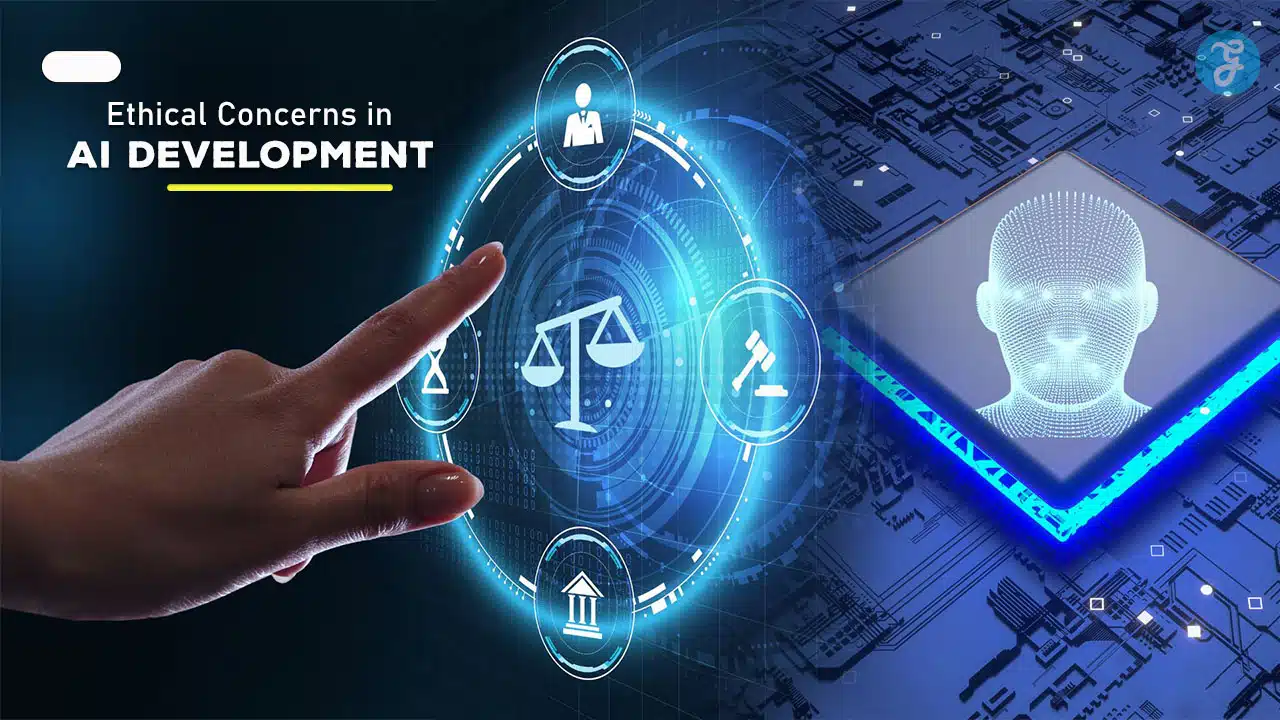The rapid development of Artificial Intelligence (AI) has transformed industries, improved efficiencies, and opened up new technological possibilities.
However, with these advancements come significant ethical concerns.
These concerns center on how AI impacts society, the workforce, personal freedoms, privacy, and human rights.
As AI systems become more complex and integrated into everyday life , it is crucial to ensure that their development aligns with ethical principles.
In this comprehensive guide, we’ll explore 10 major ethical concerns in AI development , highlighting the challenges, potential harms, and responsibilities of developers and policymakers in ensuring AI technologies are used responsibly and equitably.
1. Bias and Fairness in AI Algorithms
Why It Matters
AI systems are only as good as the data they are trained on.
When training data is biased—intentionally or unintentionally—the resulting AI models can perpetuate or even amplify existing biases.
This can lead to unfair treatment of certain groups, such as racial minorities, women, or economically disadvantaged individuals, particularly in areas such as hiring, law enforcement, healthcare, and lending.
Key Concerns
- Data Bias :
If training data reflects societal biases, AI systems can learn and reproduce those biases.
For example, AI algorithms used in hiring may favor male candidates if past hiring data shows a preference for men over women.
- Algorithmic Discrimination :
AI systems may unintentionally discriminate against specific demographics due to biased data or flawed models, leading to inequalities in critical areas such as healthcare, criminal justice , and education.
- Lack of Diversity in AI Development :
The lack of diversity among AI developers can exacerbate the problem.
A homogenous development team may not recognize biases in algorithms that impact groups different from their own.
Ethical Considerations
- Developers must ensure that AI systems are trained on diverse and representative data.
- Algorithms should be regularly audited for bias, and organizations should implement mechanisms for correcting unintended discrimination.
- Diverse teams of AI developers and researchers can help bring different perspectives to the table, reducing the risk of bias.
2. Lack of Transparency (The Black Box Problem)
Why It Matters
Many AI systems, particularly deep learning models, function as “black boxes”—their decision-making processes are opaque even to their creators.
This lack of transparency makes it difficult to understand how AI systems reach their conclusions, which raises ethical concerns, especially when these systems are used in critical areas like criminal justice, healthcare, or finance.
Key Concerns
- Accountability :
When AI systems make decisions—such as denying a loan or diagnosing a medical condition—it is essential to understand the reasoning behind the decision.
Without transparency, accountability is difficult to establish.
- Trust :
Users and stakeholders are less likely to trust AI systems when they cannot understand how decisions are made, especially when the outcomes significantly affect their lives.
- Challenges in Auditing :
Without transparency, auditing AI systems for fairness, bias, and accuracy becomes difficult, increasing the risk of errors or unethical behavior going unnoticed.
Ethical Considerations
- Developers should prioritize creating AI systems that are explainable and interpretable, especially when these systems are used in high-stakes decision-making.
- Organizations must implement transparency standards to ensure that AI systems can be effectively audited and held accountable for their actions.
- Policymakers should enforce regulations requiring explanations for AI-driven decisions that impact individuals’ rights or well-being.
3. Privacy and Data Security
Why It Matters
AI systems rely on large datasets to function effectively.
These datasets often include sensitive personal information, such as medical records, financial data, or location tracking.
The use of this data raises ethical concerns about privacy, data security, and the potential misuse of personal information.
Key Concerns
- Data Collection:
Many AI systems require vast amounts of data, which can lead to intrusive data collection practices.
Individuals may not always be aware of what data is being collected or used.
- Data Security:
AI systems are vulnerable to cyberattacks and data breaches, which can result in the exposure of sensitive personal information.
- Surveillance:
AI-powered surveillance systems, such as facial recognition, raise concerns about the erosion of privacy and the potential for mass surveillance by governments or corporations.
Ethical Considerations
- AI developers must ensure that data collection practices are transparent and that users have control over their personal data.
- Strong data security measures must be in place to protect against unauthorized access and cyberattacks.
- Privacy-preserving techniques, such as federated learning and differential privacy, can help minimize privacy risks while still allowing AI to function effectively.
4. Autonomy and Control
Why It Matters
As AI systems become more autonomous, they are increasingly capable of making decisions without human intervention.
While this can lead to efficiency and innovation, it also raises ethical concerns about who is ultimately in control and how much autonomy should be granted to machines.
Key Concerns
- Loss of Human Oversight:
Autonomous AI systems can make decisions that have far-reaching consequences, such as in military drones, autonomous vehicles, or financial trading systems.
A lack of human oversight in these areas could lead to dangerous or unethical outcomes.
- Moral Decision-Making:
AI systems are not capable of moral reasoning in the same way humans are.
Entrusting AI with decisions that involve complex ethical dilemmas—such as life-or-death situations in healthcare or warfare—raises questions about the role of human judgment in AI decision-making.
Ethical Considerations
- Human oversight must be maintained in critical AI applications to ensure ethical decision-making.
- Developers should implement “kill switches” or fail-safes that allow humans to override AI systems when necessary.
- Autonomous AI systems should be designed with ethical decision-making frameworks that guide their actions in morally complex situations.
5. Job Displacement and Economic Inequality
Why It Matters
AI and automation have the potential to significantly disrupt the labor market by replacing human workers in a wide range of industries, from manufacturing and transportation to customer service and data analysis.
While AI can create new opportunities, the widespread displacement of workers raises concerns about economic inequality and social unrest.
Key Concerns
- Job Loss:
Many jobs, particularly those that involve repetitive tasks, are at risk of being automated, leading to large-scale unemployment and economic insecurity for millions of workers.
- Widening Income Gap:
AI could exacerbate existing economic inequalities, with highly skilled workers benefiting from AI advancements while low-skilled workers are left behind.
- Skills Mismatch:
As AI takes over more jobs, workers may need to acquire new skills to remain employable, but access to education and retraining may be limited for certain populations.
Ethical Considerations
- Governments and companies must invest in education and reskilling programs to help workers transition to new jobs created by AI.
- Policies such as universal basic income (UBI) or job guarantees may need to be explored to mitigate the effects of mass unemployment caused by AI.
- AI should be designed and implemented in a way that complements human workers rather than replacing them entirely, especially in sectors where human judgment and empathy are critical.
6. AI in Warfare
Why It Matters
The use of AI in military applications, such as autonomous weapons systems, raises profound ethical concerns.
Autonomous weapons, which can select and engage targets without human intervention, have the potential to change the nature of warfare and pose serious risks to global security and human rights.
Key Concerns
- Lethal Autonomous Weapons:
AI-powered weapons that operate without human oversight could make life-and-death decisions on the battlefield, leading to unintended civilian casualties or violations of international humanitarian law.
- Escalation of Conflict:
The development and deployment of AI in warfare could lead to an arms race, with countries rushing to develop more advanced autonomous weapons.
This increases the risk of unintended conflicts and reduces the possibility of human diplomacy and negotiation.
- Accountability:
When AI systems make decisions in warfare, it becomes difficult to assign accountability for mistakes or war crimes.
Who is responsible when an autonomous weapon kills civilians—the developer, the operator, or the government that deployed it?
Ethical Considerations
- There should be international regulations and treaties governing the use of AI in military applications, ensuring that human oversight is always required in critical decisions.
- Autonomous weapons should be designed with strict ethical guidelines that prioritize minimizing harm to civilians and adhering to the laws of war.
- Policymakers must work to prevent an arms race in autonomous weapons and promote the use of AI in non-lethal military applications.
7. Manipulation and Deepfakes
Why It Matters
AI has enabled the creation of realistic yet fake content, such as deepfakes, which are AI-generated videos or images that depict events or people doing things they never actually did.
Deepfakes raise concerns about misinformation, manipulation, and erosion of trust in media and public institutions.
Key Concerns
- Misinformation and Political Manipulation:
Deepfakes can be used to spread false information, especially in political campaigns, leading to confusion, distrust, and even violence.
- Erosion of Trust:
The ability to create hyper-realistic yet false content erodes trust in legitimate media and makes it difficult for people to discern truth from fiction.
- Abuse:
Deepfakes can be used to harm individuals, such as creating non-consensual pornographic content or framing someone for a crime they did not commit.
Ethical Considerations
- Stronger regulations should be implemented to prevent the malicious use of deepfakes and other AI-generated content.
- AI developers must create tools that help detect and identify deepfakes to combat misinformation and protect individual privacy.
- Public awareness campaigns are essential to educate people about the existence and risks of deepfakes.
8. Environmental Impact of AI
Why It Matters
While AI can be used to solve environmental challenges, its development and deployment also come with significant environmental costs.
Training large AI models requires substantial computing power, which consumes large amounts of energy and contributes to carbon emissions.
Key Concerns
- High Energy Consumption:
The training of deep learning models and large AI systems consumes vast amounts of electricity, leading to a larger carbon footprint.
- Sustainability:
As AI technologies become more widespread, there is growing concern about the long-term sustainability of AI development, especially in terms of energy use and resource consumption.
Ethical Considerations
- Developers should prioritize creating more energy-efficient AI systems and explore ways to reduce the carbon footprint of AI training and operations.
- Companies and researchers should consider the environmental impact of AI and work to offset their carbon emissions through sustainable practices.
- AI could also be used to solve environmental problems, such as optimizing energy grids, improving climate models, and monitoring ecosystems.
9. Human-AI Interaction and Dependence
Why It Matters
As AI becomes more integrated into daily life, from virtual assistants to AI-driven decision-making in healthcare, finance, and education, there is a growing concern about over-reliance on AI systems.
Human dependence on AI may lead to diminished critical thinking, decision-making skills, and even job skills in certain sectors.
Key Concerns
- Over-Reliance on AI:
As people rely more on AI for everyday tasks, there is a risk that human skills, such as problem-solving and decision-making, will atrophy.
Over-reliance could also result in poor outcomes if AI systems fail or provide incorrect advice.
- Erosion of Human Agency:
Increasing reliance on AI systems may reduce individuals’ ability to make independent decisions, leading to concerns about loss of personal autonomy.
- De-skilling:
In fields such as medicine, law, or transportation, reliance on AI systems could lead to the erosion of essential human skills, reducing expertise and the ability to handle complex, non-routine situations.
Ethical Considerations
- Developers should focus on creating AI systems that complement and augment human abilities rather than replace them.
- Human users should remain in control of decision-making processes, with AI serving as a tool for enhancing human judgment and creativity.
- Education and training programs should focus on equipping people with both AI skills and critical thinking to prevent over-reliance on technology.
10. Intellectual Property and Ownership
Why It Matters
AI can generate new content, including art, music, and even patents, raising questions about intellectual property (IP) rights.
Who owns the rights to AI-generated works— the developer, the user, or the AI system itself?
The lack of clear legal frameworks around AI-generated content creates uncertainty and potential disputes over ownership and usage rights.
Key Concerns
- Ownership of AI-Generated Content:
As AI systems become capable of creating original works, it is unclear who holds the intellectual property rights—the AI developer, the person who used the AI tool, or a third party.
- AI-Created Inventions:
If an AI system invents something, who should hold the patent?
Current intellectual property laws do not adequately address this issue.
- Legal and Ethical Implications:
The absence of legal clarity around AI-generated content can lead to disputes and exploitation, particularly if creators or developers are not properly compensated for their contributions.
Ethical Considerations
- Legal frameworks must evolve to address the ownership and intellectual property rights of AI-generated content.
- AI developers and users should be clear about the ownership of AI-generated works, ensuring that creators are fairly compensated.
- Policymakers need to establish regulations that protect intellectual property rights in the age of AI.
Conclusion
The development and deployment of AI bring incredible potential for innovation and problem-solving across various industries, but they also introduce significant ethical concerns.
Issues related to bias, transparency, privacy, and accountability need to be addressed to ensure AI technologies are developed and used in ways that benefit society as a whole.
As AI continues to evolve, it is critical that developers, policymakers, and society work together to navigate these ethical challenges and create a future where AI serves humanity responsibly and equitably.






































